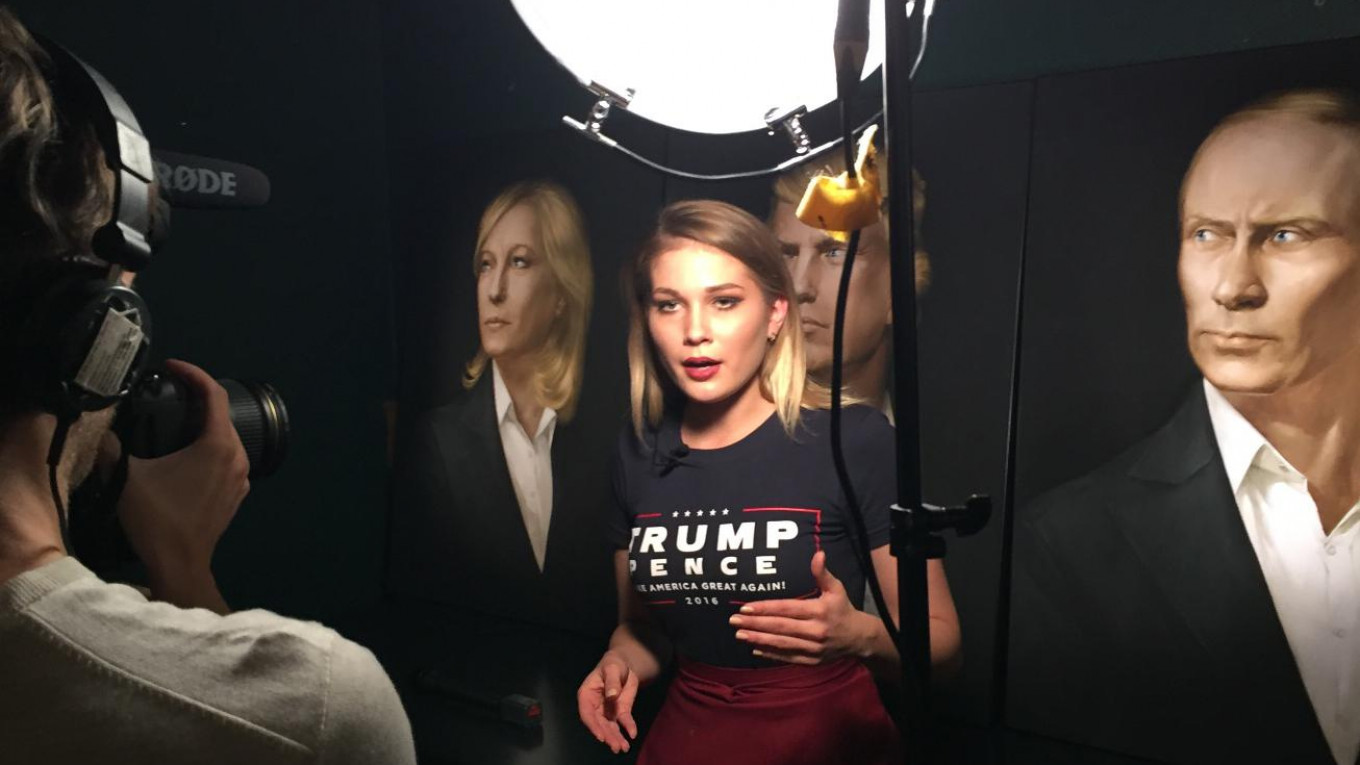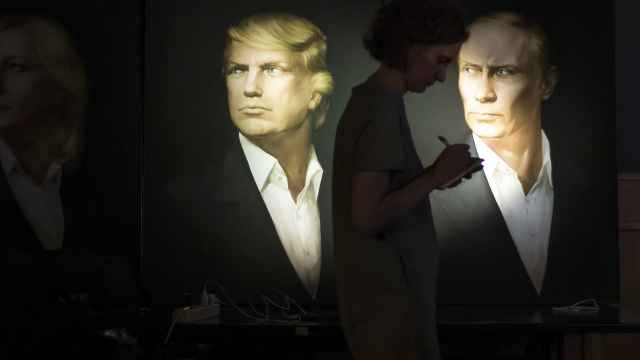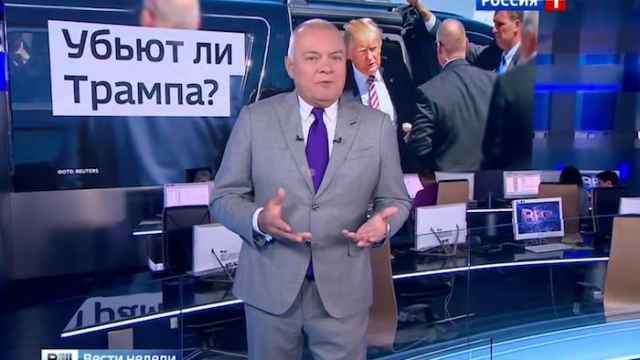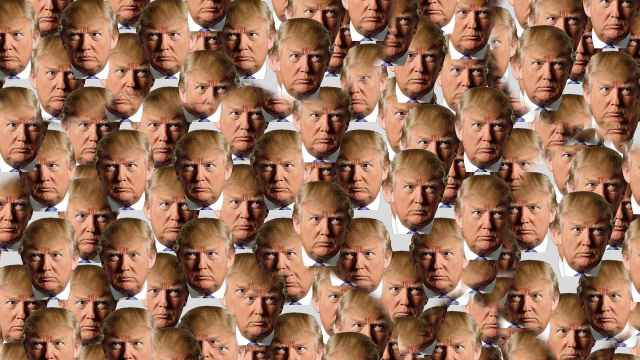“Trump! Trump! Trump!” the crowd chanted, raising their whiskey-filled glasses. The group of men then turned back to watch the first exit polls from the United States presidential election roll in on CNN.
It would have been an ordinary scene in Cleveland, Ohio or Jackson, Mississippi. But this venue was central Moscow, and the bar — filled with Russians, not Americans. Giant portraits of Vladimir Putin, Donald Trump, and France’s Marine Le Pen - the setting for many a selfie - hung in one corner, and several television screens broadcast American news.
The “Marathon for Trump” election-watching party brought together Russian fans of the Republican nominee. The event attracted an odd mix: pro-Kremlin political scientists, ultra-patriotic politicians, “political technologists,” and Russian Trump supporters dressed in campaign gear.
One of the men toasting Trump was Dmitry Drobnitsky, a Russian journalist and political scientist focused on the United States.
“Trump doesn’t resemble the American leaders of the 2000s,” Drobnitsky said. “We see that we’re on the same side as him in the struggle between the global elite and ordinary folks fighting for their own interests.”
He wasn’t alone in those sentiments. Virtually all attendees believed that a Trump presidency would benefit their country and its relations with the United States. At the start of the night, they seemed like outlandish political fringe. Now, after Trump’s historic and unexpected victory, they are decidedly mainstream.
"The hope for change in Russia has just been buried in the voting booths of Florida, Michigan, and North Carolina." Read more.
Alexei Zhuravlyov, chairman of the ultra-patriotic Rodina party in the State Duma and a man with connections to some of the organizers, hailed Trump’s pro-Russian stance as he watched the early coverage. He expressed hope that Trump would join with Russia in waging war on terrorism, rebuilding something akin the Soviet-American alliance in World War II.
“We’re under no illusions that this will be easy,” he said. “But if the U.S. isn’t the gendarme of the world, we can hope for cooperation.”
Kirill Venediktov, a political scientist and author of Black Swan, a new political biography of Trump, praised the rise of pragmatism in American politics.
“Clinton is 100 percent ideologically motivated, but Trump is a total political realist,” he said.
The gathering wasn’t all political science. Maxim Shevchenko, a prominent pro-government journalist who served as master of ceremonies, asked which of the women in the crowd would be willing to kiss Trump. (No one.) He requested that someone say something nice about Clinton. (“She taught us Russian women how to act when our husbands cheat on us!”)
At one point, egged on by Shevchenko, guests even fantasized about civil unrest in the U.S.
“I’d like to see the blacks come out…then the priests come out and say they’re defending democracy…” one intoxicated attendee slurred, before being ushered back to his table.
The drunk man’s outburst may have been outlandish, but it was not fully out of line with the tone of the evening. Many of the attendees were members of extreme patriotic movements — people who say what the Kremlin cannot. For months, they have been gunning for a Trump presidency. One participant, Marina Kostycheva, a member of Rodina, admitted as much: “We act as the ‘spetznaz’ of the Kremlin and support Western parties loyal to Putin,” she said.
As the evening began, the event seemed like the Russian Trump movement’s swan song. Now with Trump’s victory, Russia’s authorities may begin echoing the activist’s rhetoric.
When news broke on Nov. 9 that the Clinton campaign had admitted defeat, the State Duma burst into applause. Shortly thereafter, President Vladimir Putin sent Trump a telegram: in it, he expressed hope that they could help extract U.S.-Russia relations from their current crisis and build constructive bilateral dialogue.
“Trump represents the other face of the West,” Drobnitsky said. Talking to Trump, he concedes, may be “more difficult” for Russia than Clinton. “But at least we won’t be talking with a soulless political machine.”
A Message from The Moscow Times:
Dear readers,
We are facing unprecedented challenges. Russia's Prosecutor General's Office has designated The Moscow Times as an "undesirable" organization, criminalizing our work and putting our staff at risk of prosecution. This follows our earlier unjust labeling as a "foreign agent."
These actions are direct attempts to silence independent journalism in Russia. The authorities claim our work "discredits the decisions of the Russian leadership." We see things differently: we strive to provide accurate, unbiased reporting on Russia.
We, the journalists of The Moscow Times, refuse to be silenced. But to continue our work, we need your help.
Your support, no matter how small, makes a world of difference. If you can, please support us monthly starting from just $2. It's quick to set up, and every contribution makes a significant impact.
By supporting The Moscow Times, you're defending open, independent journalism in the face of repression. Thank you for standing with us.
Remind me later.






